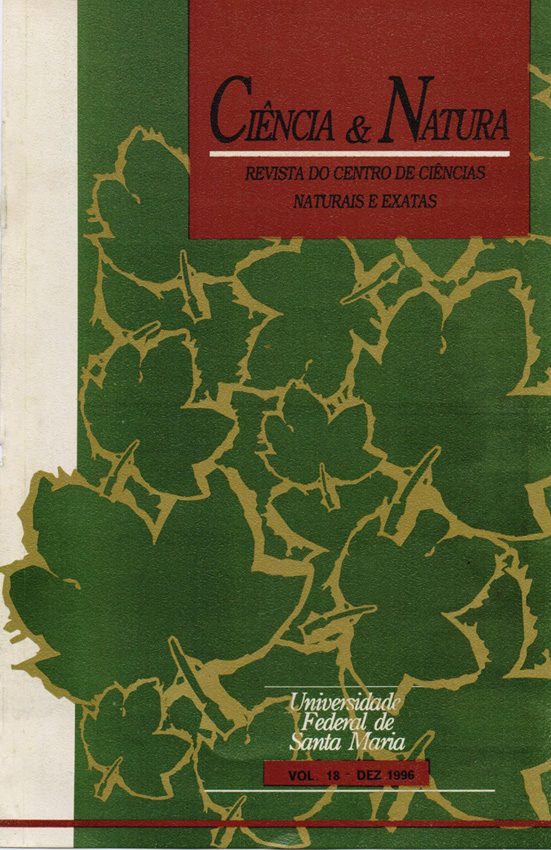Effect of Urotensin I on the ionic content of the plasma and the Gallbladder bile of Hoplias malabaricus (Bloch, 1974) (Teleostei, Characiformes, Erythrinidae)
DOI:
https://doi.org/10.5902/2179460X26605Resumo
Este estudo investigou o efeito da urotensina I (UI) na composição iônica do plasma e da bile vesicular (BV) de Hoplias malabaricus, um teleósteo dulciaqüícola. A ação deste hormônio no transporte de água na vesícula biliar também foi analisada. Os peixes foram capturados em açudes situados no campus da Universidade Federal de Santa Maria (UFSM), Santa Maria, RS. O sangue foi coletado por punção da artéria caudal e a BV drenada pelo ducto cístico. A injeção intraperitoneal de UI (500 ng/kg) em H. malabaricus aumentou os níveis de Na+ no plasma e na BV em relação ao grupo injetado com salina. Contudo, a injeção deste neuro-hormônio não alterou os níveis de K+, Ca++ e Mg++ no plasma e na BV. A vesícula biliar de H. malabaricus apresenta um fluxo de água mucosa-serosa. A incubação de sacos da vesícula biliar com UI (10-8 M) aumentou significativamente o fluxo de água. Como a UI altera os níveis de Na+ na BV e o fluxo de água na vesícula biliar, é possível que a UI participe da regulação da composição da bile de peixes.Downloads
Referências
Baldisserotto, B.; Mimura, O.M.; Farias, A.P.T.; Christensen, F. Effect of luminal pH on gastric motility "in vitro" of Hoplias malabaricus (TELEOSTEI). BoI. Fisiol. Anim. S. Paulo, v.14, p.13-17, 1990a.
Baldisserotto, B.; Mimura, O.M. and Salomão, L.C. Gallbladder bile and plasma ionic content of some freshwater teleosts. BoI. Fisiol. Anim. S. Paulo, v.14, p.7-11,1990b.
Baldisserotto, B.; Mimura, O.M. and Salomão, L.C. Effect of pH on ion and water transport in the gut of the freshwater teleost, Synbranchus mannoratus. Ciência e Cultura, v.45, p.396-398, 1993.
Baldisserotto, B.; Mimura, O.M. and Salomão, L.C. Urophyseal control of plasma ionic concentration in tilapia, Oreochromis mossambicus exposed to osmotic stress. Ciência e Natura, v.16, p. 39-50, 1994.
Bern, H.A. The elusive urophysis - Twenty-five years in pursuit of caudal neurohormones. Amer. Zool., v.25, p.763-769, 1985.
Bern H.A. and Nishioka, R.S. The caudal neurosecretory system and osmoregulation. Gunma Svmp. Endocrinol., v.16, p.9-17, 1979.
Fryer, J.N.; Woo, N.Y.S.; Gunther, R.L. and Bern, HA Effect of urophysial homogenates on plasma ion levels in Gillichthys mirabilis (Teleostei, Gobiidae). Gen. Comp. Endocrinol., v.35, p.238-244, 1978.
Lederis, K.; Fryer, J.; Rivier, J.; MacCannell, K.L.; Kobayashi, Y.; Woo, N. and Wong, K.L. Neurohormones from fish tails. 11. Actions of urotensin I in mammals and fishes. Recent Progress in Hormone Research, v.41, p.553-576,1985.
Mimura, O. M. Effects of urophyseal and terminal spinal cord homogenates on the plasma chloride level in Rhamdia sebae, a fresh water fish. BoI. Fisiol. Anim. S. Paulo, v.12, p.31-38, 1988.
Mimura, O. M. and Baldisserotto, B. Plasma ionic and osmotic concentrations of two freshwater teleost, Prochilodus aflinis and Prochilodus marggravii in different gonadal stages. BoI. Fisiol. Anim. S. Paulo, v.12, 21-30, 1988.
Mimura, O. M. and Baldisserotto, B. Water and ions isotonic transport on gall bladder in Synbranchus marrnoratus (TELEOSTEI): 1n vitro effects of urophysial homogenates. Abstract Xlth Intemational Symposium on Comparative Endocrinology, Malaga, Spain, 1989.
Woo, N.Y.S.; Tong, W.C.M. and Chan, E.L.P. Effects of urophysial extracts on plasma electrolyte and metabolite levels in Ophiocephalus maculatus. Gen. Comp. Endocrinol., v.41, p.458-466, 1980.
Woo, N.Y.S. and Tong, W.C.M. Urophyseal control of glucose metabolism and osmoregulation in the snakehead, Ophiocephalus maculatus. In: Neurosecretion: molecules, cells, systems. D.S. Farner and K. Lederis, eds., 512-513. Plenum Press, New York, 1981.
Downloads
Publicado
Como Citar
Edição
Seção
Licença
Para acessar a DECLARAÇÃO DE ORIGINALIDADE E EXCLUSIVIDADE E CESSÃO DE DIREITOS AUTORAIS clique aqui.
Diretrizes Éticas para Publicação de Revistas
A revista Ciência e Natura está empenhada em garantir a ética na publicação e na qualidade dos artigos.
A conformidade com padrões de comportamento ético é, portanto, esperada de todas as partes envolvidas: Autores, Editores e Revisores.
Em particular,
Autores: Os Autores devem apresentar uma discussão objetiva sobre a importância do trabalho de pesquisa, bem como detalhes e referências suficientes para permitir que outros reproduzam as experiências. Declarações fraudulentas ou intencionalmente incorretas constituem comportamento antiético e são inaceitáveis. Artigos de Revisão também devem ser objetivos, abrangentes e relatos precisos do estado da arte. Os Autores devem assegurar que seu trabalho é uma obra totalmente original, e se o trabalho e / ou palavras de outros têm sido utilizadas, isso tem sido devidamente reconhecido. O plágio em todas as suas formas constitui um comportamento publicitário não ético e é inaceitável. Submeter o mesmo manuscrito a mais de um jornal simultaneamente constitui um comportamento publicitário não ético e é inaceitável. Os Autores não devem submeter artigos que descrevam essencialmente a mesma pesquisa a mais de uma revista. O Autor correspondente deve garantir que haja um consenso total de todos os Co-autores na aprovação da versão final do artigo e sua submissão para publicação.
Editores: Os Editores devem avaliar manuscritos exclusivamente com base no seu mérito acadêmico. Um Editor não deve usar informações não publicadas na própria pesquisa do Editor sem o consentimento expresso por escrito do Autor. Os Editores devem tomar medidas de resposta razoável quando tiverem sido apresentadas queixas éticas relativas a um manuscrito submetido ou publicado.
Revisores: Todos os manuscritos recebidos para revisão devem ser tratados como documentos confidenciais. As informações ou ideias privilegiadas obtidas através da análise por pares devem ser mantidas confidenciais e não utilizadas para vantagens pessoais. As revisões devem ser conduzidas objetivamente e as observações devem ser formuladas claramente com argumentos de apoio, de modo que os Autores possam usá-los para melhorar o artigo. Qualquer Revisor selecionado que se sinta desqualificado para rever a pesquisa relatada em um manuscrito ou sabe que sua rápida revisão será impossível deve notificar o Editor e desculpar-se do processo de revisão. Os Revisores não devem considerar manuscritos nos quais tenham conflitos de interesse resultantes de relacionamentos ou conexões competitivas, colaborativas ou outras conexões com qualquer dos autores, empresas ou instituições conectadas aos documentos.






